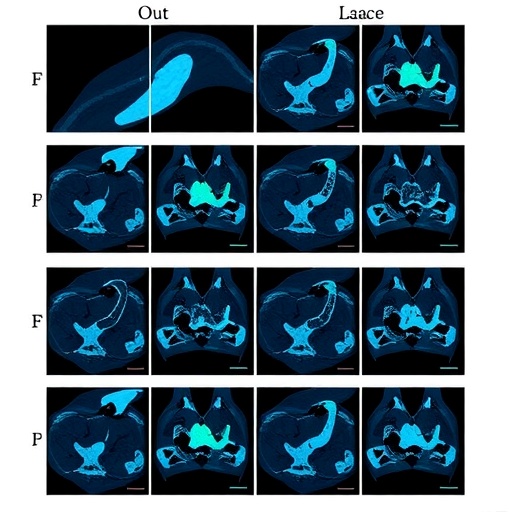In the realm of medical research, particularly concerning colorectal cancer, the burgeoning field of artificial intelligence is beginning to play a transformative role. The latest research harnesses the potential of deep learning methodologies to address the complexities surrounding the analysis of the Tumor-Stroma Ratio (TSR). By blending sophisticated convolutional neural network (CNN) architectures with innovative transformer models, the study proposes a cutting-edge hybrid deep learning framework, aptly named Efficient-TransUNet. This advancement is set to redefine traditional practices in pathology, particularly in terms of accuracy and efficiency.
Colorectal cancer remains one of the most pressing health challenges globally, necessitating advancements in diagnostic techniques that can evolve alongside our understanding of cancer biology. The Tumor-Stroma Ratio is a critical parameter in cancer prognosis, as it correlates significantly with patient outcomes. In the context of colorectal cancer, accurately distinguishing between tumor and stroma regions can delineate between aggressive and indolent disease forms. This integrative approach using machine learning aims to refine the precision of these assessments, contributing greatly to personalized patient management strategies.
The integration of deep learning into the analysis of histopathological slides represents a paradigm shift from conventional methods. Traditional manual assessments are not only labor-intensive but also subject to variances stemming from pathologist experience and subjective interpretation. By applying deep learning techniques that use patch-based classification and segmentation, this research seeks to mitigate these issues. The proposed Efficient-TransUNet model adeptly classifies patches of tissue as either normal or abnormal while concurrently segmenting critical tumor and stroma regions.
As the research reveals, the outcomes achieved through this advanced methodology significantly exceed those obtained from traditional assessment techniques. The model’s ability to automate the TSR computation is not merely a technological triumph; it represents an essential leap towards improving diagnostic workflows. The enhanced objectivity and consistency provided by the automated approach support increased diagnostic reliability, which is crucial in clinical settings where timely decisions must be made.
One of the standout features of the Efficient-TransUNet is its ability to effectively differentiate between stroma-high and stroma-low tumors within colorectal cancer specimens. This classification is particularly relevant because current studies have illustrated that these distinctions can have profound implications on treatment choices and patient prognoses. As such, the study underscores not only the accuracy of automated assessments but also their potential impact on clinical outcomes for patients receiving treatment for colorectal cancer.
Moreover, the alignment between automated calculations performed by the machine learning model and manual assessments highlights a breakthrough in ensuring that technology complements, rather than competes with, human expertise. The ability of AI systems to achieve such a strong correlation indicates their readiness for adoption into standard pathological practices, paving the way for more scalable and standardized approaches to cancer diagnosis.
The implications of employing a hybrid deep learning framework extend beyond colorectal cancer. As research in this arena develops, the methodology has the potential to be adapted for other cancer types, representing a significant advancement in the overarching strategy employed in oncological diagnostics. This adaptability emphasizes the versatility and robustness of deep learning systems, preparing them for broader application in various domains of cancer care.
With a focus on integrating these advanced systems into existing pathological workflows, the research addresses the urgent need for solutions that enhance diagnostic accuracy while also alleviating the workload burden on pathologists. As diagnostic cases continue to increase worldwide, the role of AI becomes ever more critical in ensuring that clinicians can maintain high standards of care without being overwhelmed.
The practical benefits of utilizing hybrid deep learning systems are manifold. Not only do they promise quicker turnaround times for diagnostic decisions, but they also aim to reduce subjective variability that can occur when assessments are conducted manually. This aspect is particularly vital when considering that patient outcomes can hinge upon the clarity and accuracy of such assessments. In this light, the evolution towards digital pathology, powered by AI technology, appears both timely and necessary.
As the research unfolds, it becomes evident that the potential for machine learning approaches in the realm of oncology is expansive. By accelerating the process of pathological evaluation, they represent a forward-thinking strategy to overcome the hurdles posed by traditional diagnostic methodologies. The aim is not merely to replace human pathologists but to create an ecosystem where technology augments human analysis, achieving a new zenith in medical diagnostics.
The journey of integrating advanced deep learning frameworks into clinical routine is still in its early stages. However, the promising results presented by the Efficient-TransUNet introduce a paradigm characterized by greater accuracy, heightened efficiency, and improved outcomes for patients confronting the challenges of colorectal cancer. The roadmap ahead encourages further exploration, expecting even more breakthroughs as the synergy between technology and medicine deepens.
Thus, the research not only provides a glimpse into the future of cancer diagnostics but also ignites hope for improved therapeutic strategies that can significantly enhance the quality of life for patients affected by colorectal cancer. In a world where technology continues to reshape various facets of life, its convergence with healthcare indicates a promising frontier worth watching as we stride into a new age of medical innovation.
Subject of Research: Tumor-Stroma Ratio (TSR) analysis in colorectal cancer using deep learning
Article Title: Automated tumor stroma ratio assessment in colorectal cancer using hybrid deep learning approach.
Article References:
Armand, T.P.T., Bhattacharjee, S., Nfor, K.A. et al. Automated tumor stroma ratio assessment in colorectal cancer using hybrid deep learning approach.
Sci Rep 15, 40927 (2025). https://doi.org/10.1038/s41598-025-24229-8
Image Credits: AI Generated
DOI: https://doi.org/10.1038/s41598-025-24229-8
Keywords: Deep learning, colorectal cancer, tumor-stroma ratio, convolutional neural networks, transformers, histopathology, automated assessment




